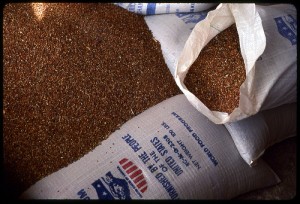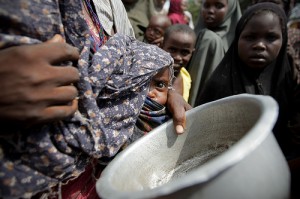With drought and famine back in the Horn of Africa, Nicolas Seris, Programme Coordinator Humanitarian Aid, Transparency International Kenya, talks about the challenge of accountability and integrity in the humanitarian aid sector.
The Horn of Africa is facing its worst drought in 60 years, with an estimated number of 12 millions people in urgent need of food assistance in Ethiopia, Djibouti, Kenya and Somalia. In Kenya alone, the international community alongside the Government and Kenyan citizens are mobilising themselves to bridge the funding gap of over 51 millions dollars to ensure the availability of food to vulnerable population until the end of the year. The needs are colossal and likely to result in a massive influx of relief aid and food commodities to drought affected areas.
Transparency International studies have demonstrated that the injection of large amounts of resources can exacerbate power asymmetries and increase opportunities for corruption and abuse of power. There is often pressure to disburse aid rapidly resulting in immense organisational challenges that come with suddenly expanding the scope and scale of programme delivery.
Risks of diversion of resources will be exacerbated by the already challenging governance situation in the drought affected countries. Ethiopia, Kenya and Somalia are ranked respectively 116th, 154th and 178th out of 178 countries in the 2010 Corruption Perceptions Index.

Photo credit: flickr_frankkeillor
Although we are still at the beginning of the emergency response, the first allegations of diversion of relief food for private gains are making the news. A Kenya local newspaper has reported that a District Commissioner has been interrogated by the police over the theft of 280 bags of 90 kilograms of relief maize. Some residents of Pokot travelled over 500 kilometres to complain to the Kenya Anti-Corruption Commission about theft and diversion of relief supplies. In South and Central Somalia, where the United Nations has declared famine, access for Humanitarian organisations to provide relief food is still very limited. Al Shabab, an Islamic militant group, that is controlling the majority of drought affected areas has banned most humanitarian actors from providing aid. Volatile security conditions in most parts of Somalia are hindering the feasibility for proper needs assessments, targeting exercises and monitoring & evaluation systems as well as other procedures that could mitigate corruption risks.
Transparency International has long held that the most damaging impact of corruption is the diversion of basic resources from the poor. Corruption in humanitarian aid is the most egregious form of this, as it deprives the most vulnerable among the poor – the victims of natural disasters and civil conflicts – of essential life-saving resources.
Being transparent and ensuring timely, adequate and accountable relief aid to population in needs is a challenge that aid providers (be they governmental, UN agencies, national or international NGOs) will have to surmount. Mitigating corruption risks is vital to ensuring that food is reaching the needy. This can be done if they take the problem seriously, carry out diligent assessments of corruption risks, ensure meaningful beneficiaries’ participation and make sure that their operations are well coordinated with those of other actors.
Transparency International is committed to work with aid providers in enhancing integrity and accountability mechanisms in the Humanitarian aid sector. In 2010, TI published a guide of good practices to support aid organisations in the prevention of corruption in Humanitarian Operations.

Photo credit: flickr/UnitedNationsPhoto
Last year, TI Kenya started implementing a programme with the objective of enhancing integrity in the food assistance sector. The Food Assistance Integrity programme will identify loopholes in the implementation of food assistance programmes. TI Kenya is working with key actors in the sector including relevant ministries, international and national humanitarian organisations (Kenya Red Cross, Save the Children UK, World Vision & WFP among others), development partners (CIDA, DFID, ECHO, GIZ) and beneficiaries to identify measures and agree upon recommendations to enhance accountability mechanisms that allow for more effective food security programmes.
The study, to be published in early 2012, will also encapsulate the findings of three case studies and analyse integrity risks within different food assistance programmes implemented in affected regions in Kenya.















 Connect with us on Facebook
Connect with us on Facebook Follow us on Twitter
Follow us on Twitter